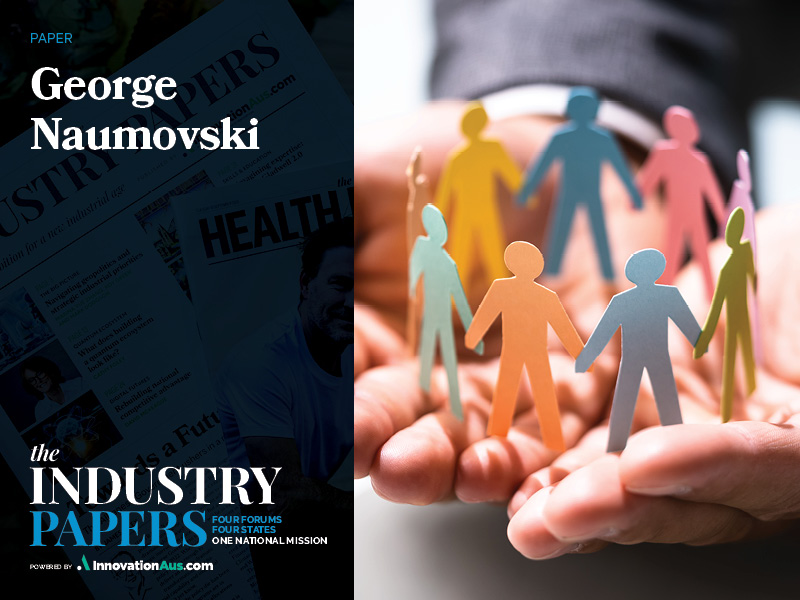If we are to create the new innovative industries that will solve problems and create innovative products, services, and jobs, then we need to include people with disabilities who have abilities, so they can participate and contribute their diverse experiences, knowledge and skills.
Diversity Equity Inclusion (DEI) is a great initiative because it gives people who may otherwise be rejected or ignored, the opportunity to participate and contribute their real-life experiences, knowledge, skills and abilities to any industry, government agency, company, business or organisation.

The five policies for people with disabilities that have abilities to be included in DEI are:
Policy 1 – Governments at federal, state and territory level need to include people with disabilities in their DEI policies.
People with disabilities who have abilities can, and want, to participate in the workplace by using their abilities if they are given the chances and opportunities to do so.
People with disabilities who have abilities can contribute to any organisation with their real-life experiences, knowledge, skills and abilities gained from work, study, training and the experience of living with a disability, by using all that they have gained to offer a different and diverse approach to work operations.
Industries, companies, businesses and other organisations could have their DEI policies aligned with government policies. If the government policies include people with disabilities, then those people can be included and given chances and opportunities in the private sector such as a career or having their business services procured.
Policy 2 – When government, industries, companies, businesses and organisations use DEI to hire a person with a disability who has abilities, it should not just be about “ticking a box” to fill a requirement or quota.
If that person is put into a role or position they are not suited to, or are incapable of, then it can have a negative effect on that person and also the company, business and organisation that has hired that person and DEI could be seen as not working. Human Resources, employment agencies, corporate/company managers and business owners need to get to know what that person’s abilities and skills are so they are placed where they can thrive and succeed within that organisation.
When that happens, both the person and the organisation thrive and DEI is seen as a very positive initiative because it actually works.
Policy 3 – When the government creates policies for the disability sector, it needs to include people with disabilities in the decision-making process.
People with disabilities know what people with disabilities need, what works and what does not, as they have real-life experiences and knowledge of the different types of disabilities from mild to severe and how they affect people – themselves and family/carers – differently.
With that experience and knowledge, the right policies and decisions can be made for people with disabilities and ensure that government agencies employ them in a broad range of positions and roles. That will create a positive outcome for them, as in the care they receive, to being included and represented in the workplace and in the general public.
Policy 4 – People with disabilities who have abilities need to be included in the DEI policies of industries, companies, businesses and other organisations.
People with disabilities who have abilities can participate, contribute and bring with them real-life knowledge, experiences, skills and abilities that any industry, company, business or other organisation can use. Using their abilities in working for and within a broad range of positions, they can have a real diverse knowledge base from which they can draw to create a better product, service, or to solve a problem.
People with disabilities who have abilities can truly be included with real full employment, with all the benefits that come from participating and contributing. Most importantly, they are at reduced risk of exploitation, as in only being included if it is at a reduced rate, or a position that is not suited to them. These are common occurrences.
Procuring the services of a disability-owned business as these entrepreneurs with disabilities have real-life and work experiences, knowledge, skills and abilities gained from creating their own businesses, products and services that any industry, company, business or other organisation can use.
Policy 5 – As all levels of government, from local to federal, release work packages, contracts and procurements, DEI policies should be requirements for any business, company or other organisation that is applying for such work packages and contracts. Those policies need to include entrepreneurs with disabilities and disability-owned businesses.
There are entrepreneurs with disabilities who have real-life and work experiences, knowledge, skills, abilities which they have drawn on to create their own businesses.
They can offer their services, products, or ideas to create a solution or solve a problem when organisations want to include diversity in the procurement of a business service.
The diverse knowledge held by entrepreneurs with disabilities will benefit organisations that include disability-owned business in their DEI policy. These entrepreneurs have more experiences, knowledge and skills that they can use to create new and better products and services, repair or improve a product or service, or solve a problem to generate beneficial social impact.
George Naumovski is a business consultant and entrepreneur. He is the founder of GNCORP, an organisation with a focus on providing business services to entrepreneurs with disabilities, and to disability-owned businesses. He started GNCORP from an idea which sprang from his own personal and professional life experiences of having a disability. GNCORP advocates for diversity and inclusion so all can have the opportunity to participate in work. It also advocates for renewable energy technologies and innovative, sustainable industries and businesses.
This article is part of The Industry Papers publication by InnovationAus.com. Order your hard copy here. 36 Papers, 48 Authors, 65,000 words, 72 page tabloid newspaper + 32 page insert magazine.
InnovationAus.com would like to thank our sponsors Geoscape Australia, The University of Sydney Faculty of Science, the Semiconductor Sector Service Bureau (S3B), AirTrunk, InnoFocus, ANDHealth, QIMR Berghofer, Advance Queensland and the Queensland Government.
Do you know more? Contact James Riley via Email.

